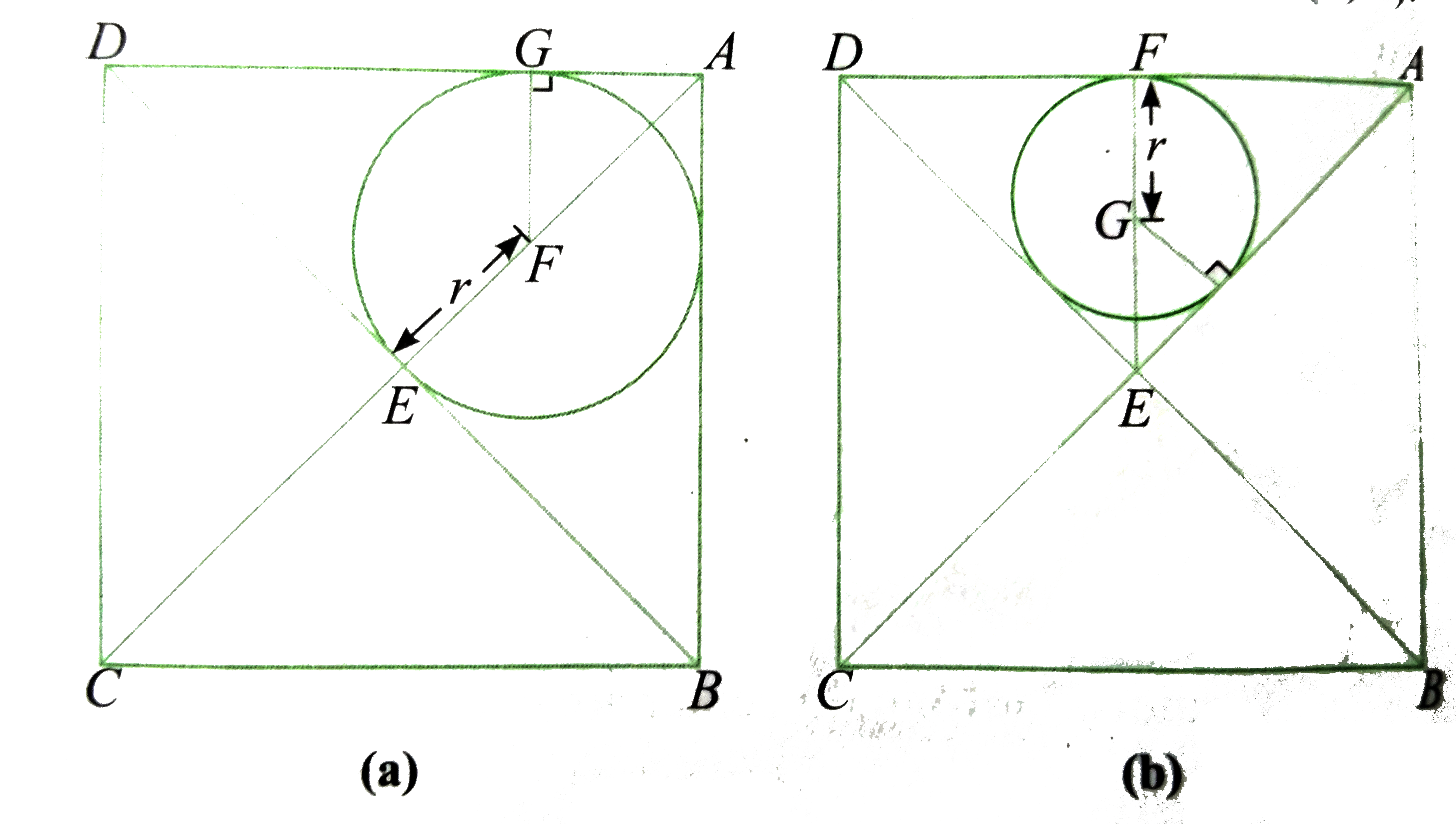Each side of a square is of length 6 units and the centre of the square Is ( - 1, 2). One of its diagonals is parallel to x+y=0. Find the co-ordinates of the vertices of the square.
(1,6)
(5,2)
(1,2)
(4,6)
The correct Answer is:4
It is given that one of the diagonals of the square is parallel to the line y=x
Also, the length of the diagonal of the square is 4√2
Hence, the equation of one of the diagonals is
x−31/√2=y−41/√2=r=±2√2
Hence, x−3=y−4=±2
or x=5,1 and y=6,2
Hence, two of the vertices are (1,2) and (5,6)
The other diagonal is parallel to the line y=−x , so that its equation is
x−3−1/√2=y−41/√2=r=±2√2
Hence, the two vertices on this diagonal are (1,6) and (5,2)

AB=4,AC=4√2
∴AE=2√2
In first figure, EF+FA=AE
or r+√2r=2√2
or r=2√2√2+1=2√2(√2−1)
In second figure, EG+FG=EF
or √2r+r=2
or r=2√2+1=2(√2−1)
Topper's Solved these Questions
- BOOK - CENGAGECHAPTER - CIRCLE EXERCISE - MATRIX MATCH TYPE6videos
CIRCLE
- BOOK - CENGAGECHAPTER - CIRCLE EXERCISE - Exercise (Matrix)1videos
CIRCLE
- BOOK - CENGAGECHAPTER - CIRCLE EXERCISE - Exercise (Multiple)25videos
CIRCLE
- BOOK - CENGAGECHAPTER - BINOMIAL THEORMEXERCISE - Question Bank31videos
BINOMIAL THEORM
- BOOK - CENGAGECHAPTER - CIRCLESEXERCISE - Question Bank32videos
CIRCLES
Similar Questions
FIITJEE CHAPTER PRACTICE PROBLEM STRAIGHT LINE 2 L I M I T E D 6 1 Each side of a square is of length 6 units and the centre of the is (-1, 21, One of square diagonals is parallel to y 0 Find the co-ordinates of the square l 2 A vertex of an equilateral triangle is (2, 3) and the opposite side is x y 2. Find the equation of other sides 3 Aline passes through the point P(2, 3 and makes an angle u with postive direction ot xais If it meets the lines represented by x -2xy -y o at the points A and B PAPB e 0, x] then number of such equal io 4 If the slopes of the lines given by the equation 24x ax y+26xy 3 ular distance oint (1, 1) from these the values of
View SolutionEach side of a square of length 6 and its centre is at the point (4,5). If one of its diagonals is parallel to the line y=x then the co ordinates of the vertics of the square are……………….
View Solution
Knowledge Check
- Question 1 - Select One
Each side of a square has length 4 units and its center is at (3,4). If one of the diagonals is parallel to the line y=x, then anser the following questions.
The radius of the circle inscribed in the triangle formed by any three vertices isA2√2(√2+1)B2√2(√2−1)C2(√2+1)Dnone of these - Question 2 - Select One
Each side of a square has length 4 units and its center is at (3,4). If one of the diagonals is parallel to the line y=x, then anser the following questions.
A2(√2−1)B2(√2+1)C√2(√2−1)Dnone of these
Each side of a square is of length 4. The center of of the square is (3,7) and are of its disgonals are parallel to y=x. Then coordinates of the vertices are?
View SolutionA square has sides of length 4 units each with its centre at (3, 4). If one of its diagonals is parallel to the line y = x, find its vertices.
View SolutionIf sides of a square is (x+2y-z) units then the area of the square is.......
View SolutionFind the length of the side of a square if the length of its diagonal is 10cm.
View SolutionIf the length of a diagonal of a square is 8 cm. Find the length of the side of the square.
View SolutionIna square one diagonal is 16cm .Find the side of the square
View Solution

